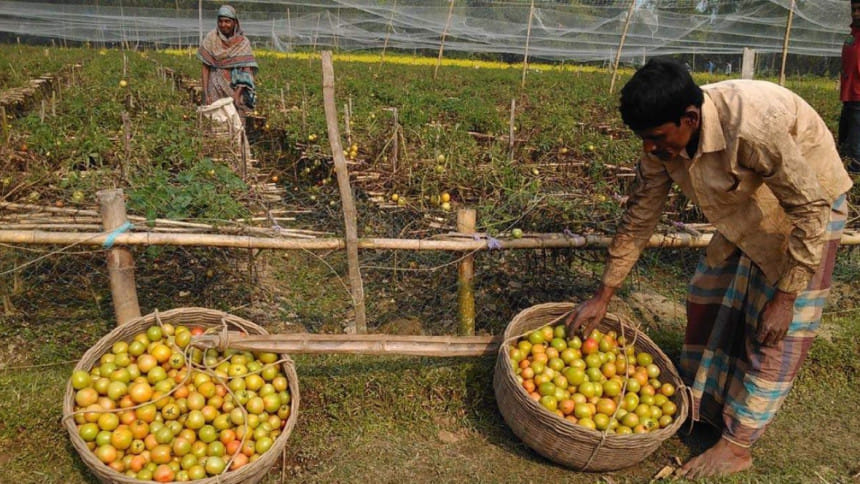Tomatoes bring prosperity to Jamuna char villages, finally

When the local farmers of Nayapara village, situated on Jamuna River char lands and part of Phulbari union in Bogra's Sariakandi upazila, exchanged paddy for tomato cultivation, they couldn't have imagined that the small red fruit, commonly eaten as a vegetable, would bring about a significant rise in family incomes that would even help them cover the cost of educating their children.
"We're having good days," says tomato grower Krisno Das, smiling. "When we sell our tomatoes in towns or in the capital, the profits are healthy." He says the success of tomato cultivation justifies the hard labour, with many local farmers working in their field dawn to dusk, and is contributing to poverty reduction in the area.
Sanaul Islam, 43, another of Nayapara's farmers says that in the past he relied on his 3 bighas of land to grow paddy, but these days he also rents 46 decimals of land from a neighbour in exchange for 14 maunds of paddy per year. Two months ago he began tomato cultivation, planting 4,000 mintu tomato seedlings, as well as some other tomato types, across his own and the leased land.
He's spent around Tk 18,000 so far, he says, but has already sold Tk. 1.12 lakh at a rate of up to Tk. 800 per maund of tomatoes. Islam anticipates his plants will yield up to 50 maunds more. "I'm hopeful that our family will be better off," Islam says, "I have some loans to repay and then I want to cover the education expenses of my two daughters. The tomato crop should make it possible."
The Department of Agricultural Extension's Bogra office reports that 2,031 acres in 12 upazilas of the district are being dedicated to tomato cultivation, especially in Dhunat and Sariakandi upazilas of the Jamuna basin.
According to one Nayapara villager, field level agriculture officials have been encouraging the tomato cultivation, in recognition of the profits to be made and the suitability of char lands for vegetable and tomato growing. They offer farmers regular advice on how to get the best harvests.
Indeed, agriculture officers in Sariakandi regard Nayapara as the best and largest vegetable and tomato cultivating village in the district.
But the situation hasn't always been so bright. Over the last two years due to political instability it was difficult for farmers to sell their tomato because wholesalers could not reach the village, which led to a minimal sale price for tomatoes if they could be sold at all. It is these difficulties from the past two years which make this year's tomato success something of a surprise, and so, so pleasing.

 For all latest news, follow The Daily Star's Google News channel.
For all latest news, follow The Daily Star's Google News channel. 



Comments